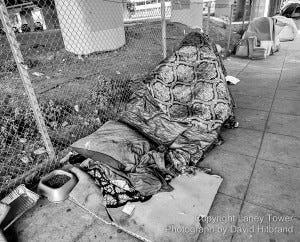
Homelessness is not a faceless collective, distinct from the rest of society. Yet our collective consciousness usually leaves the disenfranchised out in the cold, both literally and metaphorically. The obvious fact, however, is that these people deserve our love and respect just as much as anyone else.
The causes of homelessness are myriad. Sometimes it’s as easy as losing your job, which in turn means not being able to pay rent, which often results in a stint on the streets until you can “get back on your feet,” a feat easier said than done. Other times the cause is more insidious, such as drug or alcohol addiction — problems that carry their own weight to bear, on top of the constant struggle to find food or dry shelter.
The least talked about cause, but likely one of the most important, is mental instability — which can render what for a neurotypical person would be an otherwise simple task, virtually impossible.
Whatever the cause, homelessness is an undeniable problem, challenging to solve. We should be providing more services to help these people, not less. We should be putting more money into shelters, food drives, job opportunities, and education, to ensure our children have what they need to survive in a rigged economic system — while we work to change that system.
And while it is important to continue to try to keep our neighbors off the streets, some say that it is impossible to get homelessness to absolute zero — whether because of political gridlock or the difficulty of making radical change — and so we should also focus on helping them retain their dignity and human autonomy.
This is a problem that has plagued our society for generations. The problem is not the responsibility of homeless folks, but rather ours — based on how we treat them, how we see them, and how we work to address the systemic imbalances that make it such a common situation.
As you read this issue, the first part in our series on homelessness in the East Bay, keep this in mind: it is shockingly easy lose your home. Next time you encounter someone who has lost their home, show compassion; listen to what they say; and work for what they need.

























